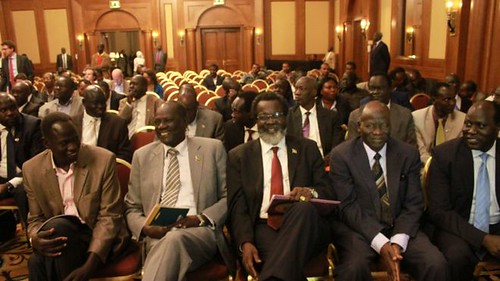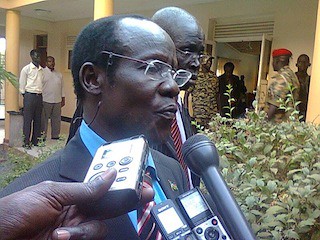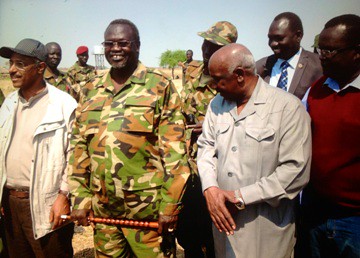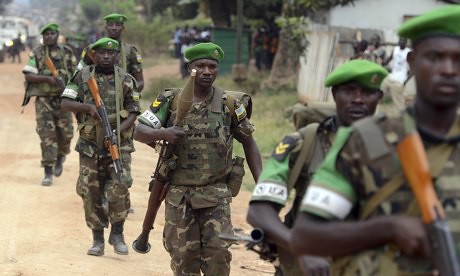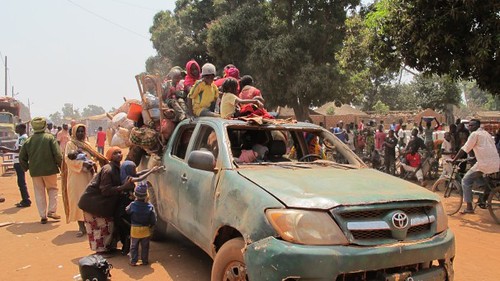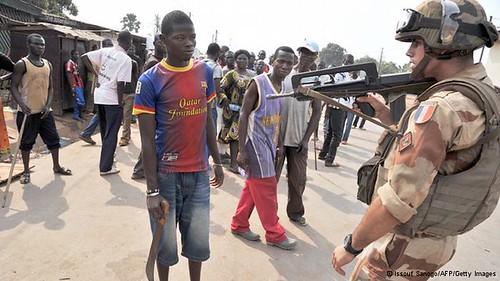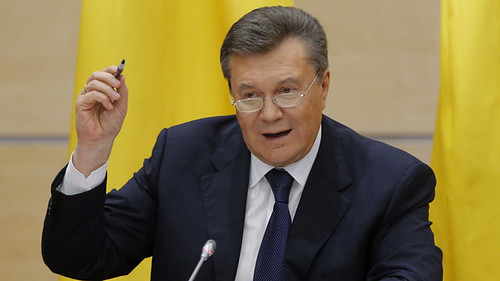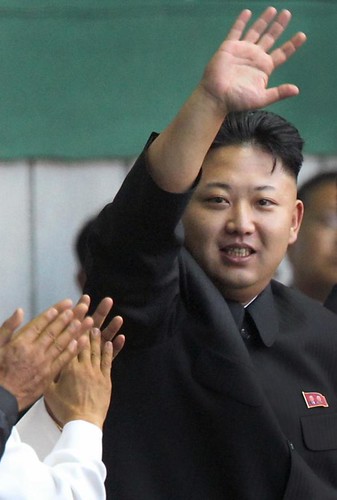Speech of Kim Jong Un at Conference of Ideological Workers
Pyongyang, February 27 (KCNA) -- Supreme leader Kim Jong Un made a speech "Let Us Hasten the Final Victory through a Revolutionary Ideological Offensive!" at the 8th Conference of Ideological Workers of the Workers' Party of Korea.
The full text of his speech is as follows:
In the meaningful period, when we greeted the 40th anniversary of the proclaiming by the great Comrade Kim Jong Il of modelling the whole society on Kimilsungism as the maximum programme of our Party, we are holding the Eighth Conference of Ideological Workers of the Workers’ Party of Korea.
Availing myself of this opportunity and in reflection of the unanimous wish of all the participants in this conference and all other members of the Party, I pay the noblest tribute to the great President Kim Il Sung, the founder and builder of the ever-victorious Workers' Party of Korea, and to the great General Kim Jong Il, the eternal General Secretary of the Party.
And on the occasion of this conference I extend, in the name of the First Secretary of the Workers' Party of Korea, warm thanks and militant greetings to the participants in the conference and all other ideological workers of the Party and primary information workers across the country, who have worked devotedly at workplaces and military posts, burning their hearts as buglers of the revolution and pathfinders of the times.
This conference convened on a scale unprecedented in the history of our Party will be a milestone of radical turn in exalting forever the brilliance of the imperishable exploits performed by the great President and the great General, who, holding the unfurled banner of the Juche idea, led the Korean revolution straightforward along the road resplendent with victory, in understanding and confirming once again the importance of ideological work and launching a vigorous ideological offensive as demanded by the developing revolution.
The most powerful weapon for a party that wages a revolution shouldering people's destiny is ideology, and it is its one and only weapon. Without ideology, a party cannot be founded nor can it exist, and its work and revolutionary struggle are inconceivable separated from ideological work. The bloodline of the revolution is defended and the revolution advances on the strength of ideology.
The one and only weapon for the Korean revolution that made its start empty-handed was a great revolutionary ideology. The revolutionaries of Korea rallied comrades and obtained weapons on the strength of the ideology; and on its strength they defeated imperialist powers and built a prospering socialism. We cannot see a revolution in the history of any country and of any party that, like our revolution, made its start with its definite guiding ideology and has turned ideology into a powerful force for a great struggle and transformation.
The whole course of the Korean revolution can be called a history of ideological work to give fullest play to the might of the truth of the revolutionary ideology of the President and the General.
In our revolution ideological work has always been the most important work, and a great tradition of ideological work was created in its first days.
Thanks to the wise leadership of the President and the General, who gave definite priority to ideological work and resolved all problems by enlisting the mental strength of the masses of the people in the whole course of their leadership of the Korean revolution, the revolution could etch only victory in its flag although it blazed the trail of history. By bringing about high tides in the mental strength of the service personnel and people, our Party has turned the trials decisive of the victory and defeat of the revolution and its advance and setback into great upswings of the revolution, and our revolution has achieved a great success whenever an upswing was effected in ideological work.
The Third Conference of Ideological Workers of the Workers' Party of Korea, which was held 40 years ago and where the great General proclaimed modelling the whole society on Kimilsungism as the maximum programme of our Party, is of special importance in the history of our Party that has opened a pivotal phase of the revolution on the strength of ideology.
That the General defined Kimilsungism as the guiding ideology of our Party and proclaimed modelling the whole society on that ideology as the maximum programme of our Party was a political event that clearly indicated the road for bringing the final victory of the Korean revolution closer and roused all the service personnel and people to achieving it.
The historic advance for modelling the whole society on Kimilsungism gave birth to a powerful political General Staff that has achieved oneness in ideology and leadership for the first time in the history of building a revolutionary party, to invincible revolutionary armed forces that march with the red flag of the Workers' Party as its first standard and to militant ranks united single-heartedly.
History clearly shows how a powerful country, which is independent, self-sufficient and self-reliant in national defence, has been built on this land where worship of big countries and dogmatism were rooted deep and a socialist fortress created, which remains unperturbed in the face of worldwide political upheaval and the imperialists' vicious moves for isolation and suffocation.
Today mankind is studying the great Kimilsungism-Kimjongilism to search for the road ahead of them. In every place of the globe the ideology centred on the masses, the revolutionary theory of independence, has become the spirit and banner of struggle of the people who aspire after genuine freedom and happiness.
Endless is the glory our service personnel and people enjoy for having waged the revolution for scores of years along the road indicated by the great ideology and in the country which is admired by the whole world and which gave birth to the ideology guiding the era of independence.
To hasten the final victory of the Korean revolution keeping up the banner of the great Kimilsungism-Kimjongilism is their faith and will and the wish of the times and history.
We must hold aloft modelling the whole society on Kimilsungism-Kimjongilism as the maximum programme of the Party and accomplish the Korean revolution without fail on the strength of ideology, on the strength of single-hearted unity.
The standard-bearers in the effort to model the entire Party and the whole society on Kimilsungism-Kimjongilism are ideological workers.
The success of not only the effort to transform all the members of society into advocates of Kimilsungism-Kimjongilism but the effort to transform all realms of social life as required by Kimilsungism-Kimjongilism depends on the success of ideological work.
You should ruminate once again on the deep reason why the General convened the conference of ideological workers and proclaimed in front of the Party information workers from across the country the programme of modelling the whole society on Kimilsungism.
We should spark off a struggle on the ideological front of the Party first and heighten the intensity of ideological work, so as to remarkably quicken the onward march of our revolution for modelling the whole society on Kimilsungism-Kimjongilism.
We have rich experiences of having forcefully propelled the historic march for modelling the whole society on Kimilsungism by dint of an intensive ideological offensive, and powerful forces and means of information and motivation work with which to stir up the whole country at once.
To hasten the final victory of the revolution by holding higher the ideological theory of Juche, a powerful weapon?this is the main spirit of this conference.
In view of the demands of the reality when modelling the whole society on Kimilsungism-Kimjongilism poses itself as the general task of the ideological work of our Party, the Party Central Committee advances the slogan, "Let Us Hasten the Final Victory through a Revolutionary Ideological Offensive!" before the Eighth Conference of Ideological Workers of the Workers' Party of Korea.
Firmly believing that all the participants in the conference and other ideological workers across the Party, aware of their honour and responsibility as the ideological standard-bearers in the effort to accomplish the cause of modelling the whole society on Kimilsungism-Kimjongilism, will give fullest play to the strength of our Party's revolutionary ideology and the inexhaustible mental strength of all the service personnel and people, I would like to speak about some problems arising in the sector of the Party's ideological work at present.
First of all, we should concentrate all efforts in the Party's ideological work on firmly establishing the Party's monolithic leadership system.
The objective of our effort to establish the Party's monolithic leadership system across the Party and society is to consolidate the unity and cohesion of the Party, the political General Staff of the revolution, and its fighting efficiency in all aspects, implement the instructions of the President and the General to the letter and realize our people's dreams and ideals at an earlier date.
Now is a crucial period when we have to break through the ordeals facing the revolution by rallying the service personnel and people more firmly around the Party and channel their patriotic enthusiasm, wisdom and resourcefulness to the utmost into stepping up the building of a thriving country.
The ideological system and leadership system for carrying out this historic task most scrupulously and perfectly is none other than the Party's monolithic leadership system.
The ideological work of our Party must naturally proceed from its basic task in the present period and direct its main effort to implementing it.
However, Party organizations are now revealing tendencies of paying only lip service to the work of establishing the Party's monolithic leadership system and engrossing themselves in paper work in this regard.
Although a Party-wide discussion of the documents on establishing the Party's monolithic leadership system was conducted and many study sessions, public lectures and oath-taking meetings held, they failed to detect and crush in advance the modern version of factionalist group which had formed within the Party.
Although there are our Party's great revolutionary ideology and absolutely correct lines and policies, Party organizations and excellent people, a factionalist group appeared within the Party again. Our ideological workers are partly to blame for this.
The identity of the modern version of factionalist group is that it was an ideologically degenerate entity which was outwardly overcome with fear for the pressure by the imperialists and inwardly contaminated with bourgeois ideology and culture.
The factionalist practice of challenging the Party's monolithic leadership system originates in ideological degeneration, and the renegades of ideology are bound to oppose the Party and the revolution in the long run.
Imbuing the Party and revolutionary ranks with one ideology?this is the seed and core of the effort for establishing the Party's monolithic leadership system.
The objective of the revolutionary ideological offensive for establishing the Party's monolithic leadership system is to make the great Kimilsungism-Kimjongilism and its embodiment, the Party's lines and policies, an element of unshakeable conviction of the masses of the people.
The revolutionary ideology of our Party has accorded with the aspirations and demands of the masses at all times, and there is no line and policy of the Party which they cannot understand and accept.
A breakthrough should be made in the ideological offensive by beginning with raising another strong wind across the Party of studying to be well versed in the immortal works of the President and the General and the documents of the Party, a library of Kimilsungism-Kimjongilism.
The works and documents are excellent textbooks for the education in the one and only ideology and a great encyclopaedia which comprehends our Party's lines and policies.
If they study them in a chronological order and in a systematic way, all Party members, other working people and service personnel can equip themselves firmly with the Juche idea, Songun idea, Kim Jong Il's patriotism, the revolutionary traditions of our Party and class awareness and fully understand the lines and policies newly advanced by the Party.
What is important is to carry on the education work in a scrupulous manner so that everybody can be well-versed in the instructions the President and the General gave to their sectors and units and the Party's policies and make them a creed in their work and life.
It is necessary to explain to the masses the Party's policies for a given period in a logical and convincing way so that they can sympathize with them and accept them as their own by themselves. You should pay attention to informing people in easy terms of what they are eager to know and hear on the basis of the Party's policies and in the way you tell a thirsty person where he or she can drink water.
In the future, if everybody at a unit is as well informed of the Party's lines and policies as they are of their family affairs, the unit will be considered to have conducted ideological work efficiently and established the monolithic leadership system.
"Exceptions" must never be permitted in ideological work.
As a saying goes that even a rolling stone may gather moss, one is bound to degenerate when treated exceptionally.
There may be some special tasks assigned by the Party, but "exceptions" cannot exist within our Party who are allowed to neglect their ideological life and be ignorant of its lines and policies. As for special units, ideological work should be strengthened further and they should be made steel-strong in the furnace of ideological struggle.
Ideological workers should be able to discern something alien, if any, at a glance at the eyes of others. They must use the ideological "scalpel" in time to root out the causes of such misdemeanors as arguing over the issues decided by the Party, undermining its leadership exploits covertly or overtly and breeding corruption within our ranks in contravention of our Party's and class principles.
It is important to conduct the work of imbuing the Party and revolutionary ranks with one ideology in close combination with the practical struggle.
Man's ideology is expressed in his practice and its outcome, rather than in his revolutionary rhetoric or pledge. He is a man armed with the Party's ideology as an element of his faith, who, though seldom speaking, carries out the plans and decisions of the Party Central Committee on the schedule set and the level demanded by it.
Endeavouring to implement the ideology of the Party and champion its policies? This is the clearest manifestation of one's loyalty to it and an important occasion to have the validity of its lines and policies as an element of one's faith.
The soldier-builders, who carried out their project on Masik Pass successfully last year, were determined to wage a death-defying struggle not to delay even for a moment the completion date proclaimed to the world by the Party Central Committee; they performed a miraculous feat of completing the project in one year, which was estimated to take ten, thus staunchly defending the prestige of the Party.
The on-site political work of the People's Army, which was a three-dimensional and offensive-style ideological work to inspire everyone from generals to privates with a single desire of fulfilling their Supreme Commander's order, serves as a good example in the ideological offensive to establish the Party's monolithic leadership system.
In implementing the instructions of the President and the General, the Party's new line of developing the two fronts simultaneously and its policies, all sectors and all units should make an ideological analysis and review of their failures and the causes for them. Then they should press on with the frontline-style information and motivation campaign to learn from the service personnel's spirit of carrying out their tasks even at the cost of their lives.
The main targets of the ideological offensive for establishing the Party's monolithic leadership system are the wrong ideological viewpoint and work attitude of the officials who give verbal support to the Party's policies but do not implement them immediately.
It is urgent to combat the ideological maladies of the officials who remain indifferent to the obstacles lying in the way of implementation of the Party's policies for their own sectors, units and regions, as well as to the difficulties facing the people in their living. The ideological education and campaign aimed at rooting out such undesirable ideological elements as defeatism, self-preservation, formalism, expediency, irresponsibility and self-centredness should be conducted with an appropriate methodology. The information and organization sectors of the Party should be scrupulous in working in close cooperation with each other, while the ideological campaign should be combined with legal actions to maximize its efficiency.
The soaring mental spirit of our service personnel and people, who, after liquidating the modern version of factionalist group, have hardened up their determination to follow the Party Central Committee invariably along the long road of revolution, should be fanned to flare up into flames of a great revolutionary upsurge.
Historically speaking, great victory was won in the Fatherland Liberation War after the purge of an anti-Party, counterrevolutionary factionalist clique following the Fifth Plenary Meeting of the Party Central Committee; the Chollima upswing was brought about in the course of eliminating the August 1956 factionalist group; and world-startling successes were achieved in the showdown with the United States and the socialist industrialization drive after the anti-Party revisionists were exposed and purged at the 15th Plenary Meeting of the Fourth Party Central Committee.
The Party's ideological front should actively encourage all Party members and other working people to follow in their forerunners' footsteps and become standard-bearers and meritorious workers in the struggle to champion the Party Central Committee by bringing about a revolutionary upsurge.
If all service personnel and people, rallied firmly around the Party, make substantial progress in socialist construction, those who are wavering for lack of confidence will be brought to their senses and the monolithic leadership system of the Party will be established solidly across the Party and society.
Another important task facing the ideological work of our Party is to raise a strong wind of ideological campaign to give an impetus to the struggle for defending socialism.
In the present era, as in the past, socialism represents the ideals of mankind, and it is an irreversible trend of the times.
We are now following the untrodden path of history as we risk the dignity of our independent people and the destiny of socialism in the struggle to repulse the imperialists' frantic attacks. Today the path of socialism and the inevitability of its victory depend on the struggle of the Korean revolutionaries.
In performing this honourable mission our Party and people have assumed for history, ideological workers, the red, hardcore elements of the Party, should become undying torchlight and loud bugles.
They should give Party members and other working people a clear understanding of the essence and character of the present struggle to defend socialism.
In the struggle we waged in defence of socialism in the 90s of the last century, we created a historic miracle of safeguarding our ideology and system against the allied imperialist forces' moves to isolate and stifle our country.
The ongoing struggle to defend socialism can be said to be aimed at prevailing over imperialism in all fields of social life by consolidating the victories and successes achieved so far and giving fullest play to the advantages and might of socialism.
Recently, our Party has put forward both the agricultural and scientific fronts as outposts for defending socialism. Its intention is to constantly remind our people that not only on the frontline where guns are levelled at each other but also in all other places where they live, they are engaged in invisible, fierce confrontation and competition against imperialists. If we, resting on our laurels and praising ourselves, do not give spur to the revolution and construction and thus fail to bring real benefits to the people, such socialism is doomed to lose its appeal.
We should build a thriving country at an early date by giving fullest play to the advantages and might of socialism, which capitalism can never imitate nor possess, so as to make socialism as different in all respects from capitalism as heaven is from earth.
A vigorous ideological campaign should be launched to demonstrate the might of great army-people unity on a higher level in building a thriving country.
The solid single-hearted unity of the army and people around the Party constitutes the cornerstone of our style of socialism and the great foundation in building a thriving nation.
The eye-opening miracles which have been wrought recently in succession, shaking the land, mountains and rivers throughout the country are all fruition born of the great unity between the service personnel and people, their concerted efforts.
The People’s Army should, in the future, too, be the prime mover and pioneer in strengthening this great army-people unity. It should intensify information and motivation work geared to giving full play to the might of an army strong in ideology both in national defence and socialist construction. Party organizations and political organs in the army should ceaselessly create such terms of our era as the "Masikryong speed" by carrying forward the proud history of the revolutionary army which has proved with its indomitable revolutionary spirit that Korea's determination is just its materialization and reality, and civilian Party organizations should accelerate the work of learning from the revolutionary spirit and fighting style of the service personnel.
When the time comes when we have to fight an all-out life-and-death fight with the enemy, we should achieve its final victory on the strength of the great army-people unity, all-people resistance, based on the revolutionary soldier spirit.
All sectors and all units should launch a dynamic ideological offensive so as to make the flames of collective innovations flare up.
Our people have already gained a valuable experience of ushering in a heyday in socialist construction through an all-people, collective innovation movement in the 1970s, a decade of great changes.
In the 1970s when the country was resounding with the drumbeats of revolution and the bugle sounds for speed campaign, they brought about grandiose creation and changes unprecedented in the history of their country, while militarily coping with the large-scale war exercises staged by the US imperialists. It was during those days that our country abolished the taxation system for the first time in the world, enforced a universal 11-year compulsory education and rendered a colossal amount of assistance to the developing countries and the fighting peoples of the world.
It is the intention of our Party to carry on the building of an economic giant and a civilized state by bringing into play the might of socialism, the might of collectivism, as in the 1970s.
The flames of the movement of winning the title of O Jung Hup-led 7th Regiment and the three-revolution red flag movement should flare up more fiercely in the military and civilian units, respectively, and vigorous socialist emulation drives be launched among sectors, units and regions and by stages: by doing so, we should ensure that a strong wind of collective competition sweep the whole country.
At present our Party demands that all the military and civilian sectors create model units and, with them as the initial spark, kindle the flames of joint innovations.
Ideological workers should pay attention to enlisting the creative zeal and activeness of the masses both in creating such units that advance ahead of the times and in organizing competition for overtaking them.
An ideological campaign against the abuse of authority and bureaucratism should be intensified to make all officials props that, sharing weal and woe with the masses, unite their collectives and reliable point-men in the mass innovation movement.
Efforts should be channelled into the information and motivation work for bringing into full play the spirit of self-reliance whose might has fully been attested in the severe trials of history.
We can say that the whole history of socialism of our own style boils down to self-reliance. In the days of building socialism by their own efforts, our Party and people underwent unprecedented ordeals and difficulties, but they were loaded with all honours they could not enjoy through the history of their nation spanning thousands of years. Had we abandoned the principle of self-reliance succumbing to the pressure by outside forces, the Juche-oriented socialism would not have been born on the earth and the name of our country would have suffered eclipse along with the collapse of the worldwide socialist system. On the track of self-reliance Chollima rose up on the ruins of war and such a miracle as the birth of a manufacturer and launcher of an earth satellite and nuclear state was wrought, a miracle of great significance in the national history.
Ideological workers should intensify education by means of the history of our socialist construction among officials and working people to clearly implant in them that self-reliance is the path of building a thriving nation.
Self-reliance is the spirit of national self-sustenance and the spirit of going beyond the cutting edge to lead the whole world with our efforts, with our resources and with our technology. It is necessary to steadily succeed the fighting spirit with which we made tractor and electric locomotive from scratch and the spirit with which we conquered space with our efforts and technology. We should undertake an information and motivation offensive to ensure that everyone turns out in the campaign to make everything of our country the assets of socialism that cannot be found elsewhere in the world, fully conscious that they must go beyond the cutting edge just in their own posts and workplaces. We should ideologically support the efforts to make a breach in imperialist manoeuvres to monopolize high technology, and make advanced science and technology our own.
It is important to actively encourage scientists and technicians to firmly defend their revolutionary positions in the grand march of self-reliance which is led by the locomotive, called "science and technology." Ideological workers should play a great role in creating the climate of attaching importance to science throughout society and making all people well-versed in science and technology.
We must launch an information offensive to ideologically and morally overpower the imperialist reactionary forces who are trying to stamp out socialism by all means.
Now the imperialists are hell-bent on a smear campaign to turn black into white and persisting in their attempts to infiltrate corrupt reactionary ideology and culture into our country with our service personnel and young people as the target, while clinging to manoeuvres to apply sanctions against our country and stifle it. Whereas the reactionary ideology and culture were their guide to aggression in the past, they are playing a leading part in aggression at present.
The struggle to defend socialism should be an offensive operation to, outwardly, gain political and ideological upper hand over the imperialists that hinder our onward movement and, inwardly, sweep up non-socialist practices and decadent ideology and culture by means of the revolutionary ideology and culture.
Ideological workers should dishearten the enemy by launching a skilful anti-enemy media warfare, radio warfare, which is aimed at giving wide publicity to the validity of our ideology and cause and at laying bare the vulnerability and foul nature of imperialists.
They should make ideological "missiles" in larger numbers that can deal a heavy blow at the enemy and instil firm confidence in victory in our service personnel and people.
They should take the initiative in launching operations to make the imperialist moves for ideological and cultural infiltration end in smoke, while putting up "mosquito net" double and treble to prevent the viruses of capitalist ideology which the enemy is persistently attempting to spread from infiltrating across our border.
By nature, the working masses reject the bourgeois ideology and culture which preach the money-is-almighty principle and the law of jungle. We need to create and propagate larger numbers of wholesome and revolutionary works of art and literature, articles and presentations of our own style which contain the beautiful dreams and ideals of the masses and which brim over with national flavour, so as to make the people turn their backs on the bourgeois ideology and culture of their own accord. A decisive measure should be taken to use the Internet as a medium for giving publicity to our ideology and culture in order to cope with the enemy's moves to widely propagate their reactionary ideology and culture by misusing the latest scientific and technological achievements made by mankind.
The sector of ideological work and related units should work out elaborate plans for putting mass media and external publicity means on a modern and IT basis and make persevering efforts to carry them out.
The ideological work of the Party should be conducted in an aggressive manner.
Our Party's strategy and tactics in ideological work is to make the whole country seethe with a revolutionary leap forward by making the flames of ideological offensive flare up fiercely in the attack spirit of advancing against all odds.
The ideological position of our Party should be arranged in the form for attack, not for defence.
We should also conduct the ideological education aimed at imbuing the whole society with the red ideology of the Workers' Party in a proactive way, the political work aimed at calling forth the mental strength of all the service personnel and people as it is done on the frontline and the struggle to sweep away all shades of evil ideas and spirits at a lightning speed.
In order to conduct ideological work in an aggressive manner, it is necessary, above all, to root out the defeatist view revealed among ideological workers.
The ideological workers infected with such a view cannot take even a single step by themselves even if they are put forward in the van of the ideological offensive.
The "Yongil bomb spirit" created in the forest of Mt. Paektu and the do-or-die resistance spirit of Xiaowangqing and Chechangzi were not produced in ordinary days, and the legend of Chollima, the miracles of the speed campaign, the revolutionary soldier spirit and the Kanggye spirit were not born under more favourable circumstances than in the present days.
Comrades,
Defeatism in ideological work is more dangerous than that in economic work. The present ideological offensive must start with ridding ideological workers of defeatism.
Those engaged in ideological work in the birthplace of the Juche idea must not wait for a miracle to be wrought, but go purposefully amongst people carrying the weapon of ideology and become active doers and devoted creators who find solutions with them.
The posts of national defence, factories, farm villages and other places where you are working bear the imprints of examples of outstanding art of leadership set by the peerlessly great men who found in the simple opinions of the service personnel and people the best method of turning misfortune into a blessing and adversity into prosperity.
If you work with the history of revolutionary leadership of the President and the General as a textbook, you will find nothing you cannot understand and overcome in your work, and our Party's ideological work become literally an initial spark for kindling the flames of a leap forward.
In order to ensure a revolutionary ideological offensive a success, we should open the gunfire of an ideological campaign and fire the shells concentratedly, successively and at the right targets.
First of all, by enlisting all the forces and means already provided for information and motivational purposes, you should conduct ideological work in a flexible and intensive way.
When the Party puts forward a new line or policy, all the networks of education, public lecture and motivation work and mass media should be mobilized promptly to inform all the people, ranging from officials at the central organs to farmers in remote, mountainous villages, of it. The contents, forms, means and methods of ideological work should, to all intents and purposes, be geared and subordinated to carrying out revolutionary tasks. The forces and means for information and motivation work should be concentrated on the projects the Party attaches importance to, thus strongly beating the drum for kindling the fire of a fresh leap forward.
Ideological work should also ensure that all shades of evil ideas and spirits never make inroads into our ranks by giving uninterrupted publicity to the Party's intentions and leading a continuous advance of the ideological struggle.
It can be likened to removing falling snow on the runway by snow blower to prevent it from piling up. Ideological work should be conducted not like a flash in the pan and in the way a ceremony is held, but in a regular way regardless of time and place so that people can imbibe the Party's ideas the way they breathe air. An ideological campaign should be conducted without letup and intensively to sweep away alien ideological trends and lifestyles. To be strictly guarded against here is the repetition of the stereotyped speech and method.
It is also important to select the right targets of the ideological offensive based on an understanding of their preparedness, characteristics and ideological tendencies, and apply appropriate means and methods.
President Kim Il Sung already said that work with people should be conducted in the way a mother does, as she uses different words when teaching her eldest son and youngest son though they are of the same blood. If the employees of their units number ten thousand, ideological workers should know the inner thought of each of them like their own palms and work with them with ten thousand methods.
The road of our revolution is not smooth, and every revolutionary front requires genuine and well-qualified ideological workers who have cherished the staunch revolutionary spirit in their hearts.
In fact, the forces of our Party’s information workers and primary information workers enrolled in the networks of education, public lecture and motivation work are great. If they, numbering tens of thousands, are well prepared, we can form an elite corps and if we have such a contingency, we will have nothing to be afraid of and out of reach of our strength.
Of his revolutionary soldiers, the great General treasured and loved most dearly those who are defending the ideological front, and led and encouraged them at every step, saying that a film or an article is as powerful as several thousand tons of food grain or tens of thousands of gun shells.
The ideological workers of our Party have assumed a heavy task.
Each of them should become a person strong in ideas and faith, whom the enemy fear more than they do the forces of a division or a corps.
Although simple and modest in appearance they always burn their hearts with the Party's intentions and are enthusiastic for the revolution and struggle?this is the feature our Party thinks ideal for information workers. Ideological workers should be true revolutionaries who never give up the Party's principle of ideological work in any adversity.
They should have the passion of covering long distance in one night to inform people of the Party's intentions and burning the midnight oil for several days to study the Party's policies and learn knowledge and technology.
Having a proper outlook on people is a vital requirement for ideological workers who have to make them open their minds.
The information workers of our Party should be true sons and daughters of people who learn from the latter before teaching them and highly appreciate their efforts. To this end, they should remember first whenever they approach them that they stand before the great people whom the President and the General believed as in heaven and regarded as their teachers all their lives.
Love and respect for the labouring people emanate from the spirit of loving labour. Our officials should mingle with the masses, their hands stained with grease and their shoes with earth, and be proud of it.
The President and the General performed
great exploits for people all their lives, but left nothing for themselves.
Regarding the ideas and trust of the Party as the wealth of their lives, ideological workers should find the worth of living in informing as many persons as possible of the Party's policies and having collective innovations brought about at the units under their charge.
A genuine ideological worker is the person who values more than nuggets of gold the excitement he or she feels when people are eager anytime to be informed of the Party's intentions and when they support the Party's policies with all their hearts.
When the Party's intentions are informed and revolutionary songs and hurrah for the Workers' Party and socialism resound wherever our Party's ideological workers go, it will be a great encouragement to the Party.
The entire Party should become information and motivation workers, and all officials should conduct political work.
Whether they are Party, administrative, economic or primary officials, they should hold it as the main key to motivate the mental strength of the masses, and direct due efforts to it. In particular, chief secretaries of provincial, city and county Party committees and senior Party officials of all sectors and all units should put the ideological work under their personal control and conduct it with all sincerity and with much effort.
In the 1970s all the officials, under the leadership of the Party, used to go down to their subordinate units with rucksacks on their backs like the anti-Japanese guerrillas had done, rouse people as required by the Chongsan-ri spirit and Chongsan-ri method and bring about innovations. This vibrant spirit should prevail throughout the country.
Comrades,
The revolutionary task facing us are enormous and the situation remains as severe as ever. However, we should leap forward to bring the future closer and make a ceaseless advance while struggling.
As soon as you leave the venue of this conference, you should go amongst the service personnel and people to inform them of the intention of the Party Central Committee and take up the starting positions of ideological offensive with a fresh determination.
I stress once again: The more vibrantly the ideological front seethes, the more fully the mental strength of the masses will be demonstrated, and the more the service personnel and people are roused, the faster the revolution will advance.
I firmly believe that all our ideological workers, including the participants in this conference, will become political workers of the type of the great Comrades Kim Il Sung and Kim Jong Il and make the whole country seethe and transform the entire army along revolutionary lines, thus hastening the final victory.
6th Conference of Ideological Officials of WPK
Pyongyang, February 27 (KCNA) -- The 6th Conference of Ideological Officials of the Workers' Party of Korea took place here in March Juche 83 (1994).
The conference reviewed the successes and experience gained in the party ideological work for modeling the whole society on Kimilsungism in the past and discussed measures to further improve the ideological work as required by the changed situation.
It underscored the need to intensify the party ideological work to push forward with the revolution and construction and defend the Korean-style socialism centered on the masses, advancing the tasks and ways to that effect.
After the conference, a brisk ideological work was conducted in order to further consolidate revolutionary ranks single-mindedly united around leader Kim Jong Il and give full play to the revolutionary spirit of self-reliance and fortitude.
A big stride was made in the efforts to enhance education in the greatness and leadership feats of Kim Jong Il, which enabled officials, party members and other working people to remain loyal to the WPK's guidance with deep reverence for Kim Jong Il.
The party's line and policies were timely conveyed to party members and other working people with a well-planned system of political education established and the role of agitators enhanced.
In particular, a drive to thoroughly establish the party's leadership system among the media and literature and art fields was made in a vigorous way.
The ideological work began to be carried out in keeping with the specific conditions as done by the anti-Japanese guerrillas.
Rodong Sinmun Calls for Invigorating Ideological Campaigns
Pyongyang, February 27 (KCNA) -- Rodong Sinmun Thursday editorially calls on all party ideological officials to raise a strong wind of ideological, information and agitation campaigns and vigorously encourage all the service personnel and people to the drive for the final victory in building a thriving nation, true to the speech made by supreme leader Kim Jong Un at the 8th Conference of Ideological Officials of the Workers' Party of Korea.
His speech is a great strategic programme indicating the ever-victorious future of the Korean revolution, the editorial says, and goes on:
Steadfast is the will of Kim Jong Un to bring earlier the final victory of the revolution on the basis of the Juche-oriented theory of idea, a powerful weapon.
It is a great pride of our party to have a large number of the ideological officials remaining unfailingly loyal to the party and the leader, possessed of a high degree of revolutionary spirit and lofty traits.
The ideological officials of our party are standing in the van of the grand drive for modeling the whole party and society on Kimilsungism-Kimjongilism and bringing earlier the final victory in building a thriving nation.
We have rich experience in stepping up the cause for imbuing the whole society on the monolithic idea through a strong ideological offensive as well as powerful information and agitation means available throughout the country.
If the ideological officials are well prepared, elite army corps can be formed and if we have these forces, we have nothing to fear and there is nothing impossible to do.
All ideological officials of the party should discharge their duty as pioneers and pacemakers in the drive for the prosperity of Songun Korea, bearing deep in their mind the important responsibility and mission they assume for the party, revolution, country and people.
Rodong Sinmun Calls for Giving Priority to Ideology
Pyongyang, February 27 (KCNA) -- It is the truth of history that if one takes hold on ideology, he is sure to win, says Rodong Sinmun Thursday in an article.
It goes on:
Ideology is the life and soul of socialism.
Powerful military and economic potentials are too incompetent to defend the gains of revolution won by blood if the ideological position is disintegrated.
This is evidenced by the historic lesson of socialist construction.
In the past some socialist countries failed to pay due attention to the ideological work to educate popular masses. They leaned only on economic construction.
As the people in those countries had no worries and led a stable life, their revolutionary enthusiasm was gradually dampened and tried to lead an easy life.
They did not want to devote themselves to socialism but started to have illusions about capitalism. In the long run, they betrayed socialism, taken in by the false propaganda of the imperialists and reactionaries. As a result, economic construction fell into stagnation in these countries and finally socialism collapsed and capitalism was restored.
The national defense capabilities described as the most powerful in the world were demolished overnight. Soldiers became blind, unaware of their mission. The army that was disarmed ideologically did not prevent the socialist system from collapsing.
There is nothing impossible in the world if the mental power is enlisted by dint of ideology.
This is proved by the practical experience of the Korean revolution which has won victories by dint of ideology.
